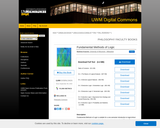
Contains cover sheet with examples.
- Subject:
- Elementary Education
- Material Type:
- Lesson Plan
- Author:
- Johanna Richards
- Date Added:
- 05/30/2019

Contains cover sheet with examples.

Contains: Because Tool Overview

This is a critical thinking evaluation report that may be used as an assignment resource, free of charge, by any educator for the purposes of higher learning. It has been utilized as a resource in:2022-2023 UNC Undergraduate Research Program. Fostering Critical Thinking in Human Motion Analysis. Brown, J., Chandler, R., Fiaud, V., and Armitano, C. This resource was recently featured in a presentation at the National Association for Kinesiology in Higher Education in January of 2024 and disseminated for public use. For more information, please email:jjbrown@ecsu.edu

This activity allows students to practice agreeing and disagreeing with popular opinions. Students will have provide a sign of whether they agree or disagree with the statement and explain why

Fundamental Methods of Logic is suitable for a one-semester introduction to logic/critical reasoning course. It covers a variety of topics at an introductory level. Chapter One introduces basic notions, such as arguments and explanations, validity and soundness, deductive and inductive reasoning; it also covers basic analytical techniques, such as distinguishing premises from conclusions and diagramming arguments. Chapter Two discusses informal logical fallacies. Chapters Three and Four concern deductive logic, introducing the basics of Aristotelian and Sentential Logic, respectively. Chapter Five deals with analogical and causal reasoning, including a discussion of Mill's Methods. Chapter Six covers basic probability calculations, Bayesian inference, fundamental statistical concepts and techniques, and common statistical fallacies.

Inferring and Explaining is a book in practical epistemology. It examines the notion of evidence and assumes that good evidence is the essence of rational thinking. Evidence is the cornerstone of the natural, social, and behavioral sciences. But it is equally central to almost all academic pursuits and, perhaps most importantly, to the basic need to live an intelligent and reflective life.

This lecture presents Explanation as a rhetorical mode for composition. The lecture is offered here in three different formats: video without captions, video with captions, and a full text transcript.